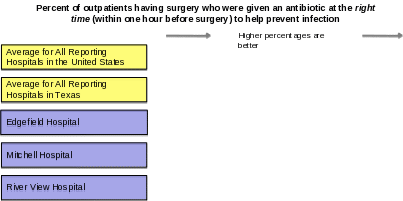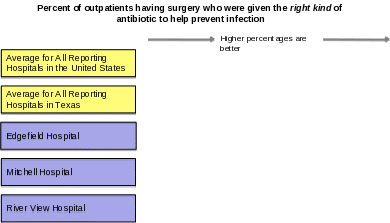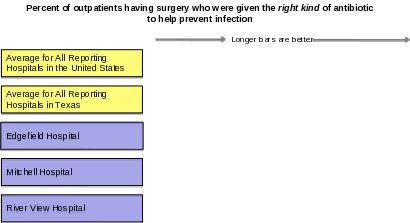CMS-10310.Mockup 2_Surgery Measures_REV_1_15_v2
CMS-10310.Mockup 2_Surgery Measures_REV_1_15_v2.docx
Consumer Research on Public Reporting of Hospital Outpatient Measures (CMS-10310)
CMS-10310.Mockup 2_Surgery Measures_REV_1_15_v2
OMB: 0938-1081
Surgery Measures – Compare Hospitals
Your Selected Hospitals |
EDGEFIELD HOSPITAL |
MITCHELL HOSPITAL
|
RIVER VIEW HOSPITAL |
||
Surgical Care This measure shows how well hospitals are following standards of care for patients having surgery. These standards are based on medical research that has shown how hospitals can reduce the risk of wound infection after surgery by making sure patients get the right medicines at the right time on the day of their surgery. Add text or link here to explain that, for the time being there will be some quarters of data included that have not been validated. |
|||||
T |
|||||
|
Outpatient surgery |
||||
|
Percent of outpatients having surgery who were given an antibiotic at the right time (within one hour before surgery) to help prevent infection (a higher percentage is better) |
92%1 |
92% |
70% |
|
|
Percent of outpatients having surgery who were given the right kind of antibiotic to help prevent infection (a higher percentage is better) |
69%1 |
90% |
97%
|
|
|
Inpatient surgery |
|||
|
New! Percent of inpatients having surgery who were taking heart drugs called beta blockers before coming to the hospital, who were kept on the beta blockers during the period just before and after their surgery |
85% |
77% |
87% |
|
Percent of inpatients having surgery who were given an antibiotic at the right time (within one hour before surgery) to help prevent infection |
97% |
95% |
88% |
|
Percent of inpatients having surgery who were given the right kind of antibiotic to help prevent infection |
92% |
93% |
87% |
|
Percent of inpatients having surgery whose preventive antibiotics were stopped at the right time (within 24 hours after surgery) |
95% |
88% |
73% |
|
Percent of all patients having inpatient heart surgery whose blood sugar (blood glucose) is kept under good control in the days right after surgery |
92% |
90% |
72% |
|
Percent of inpatients having surgery who need hair removed from the surgical area before surgery, and who had hair removed using a safer method (electric clippers or hair removal cream – not a razor) |
100% |
99% |
89% |
|
Percent of inpatients having surgery whose doctors ordered treatments to prevent blood clots after certain types of surgeries |
90% |
96% |
81% |
|
Percent of inpatients having surerrey who got treatment at the right time (within 24 hours before or after their surgery) to help prevent blood clots after certain types of surgery |
85% |
19% |
75% |
|
|
|
|
|
1 The number of cases is too small to tell how well a hospital is performing.
Outpatient Surgery
Measures based on standards of care |
Compare the hospitals to this: |
Compare the hospitals to this: |
EDGEFIELD HOSPITAL |
MITCHELL HOSPITAL |
RIVER VIEW HOSPITAL |
UNITED STATES AVERAGE |
TEXAS AVERAGE |
||||
Percent of outpatients having surgery who were given the right kind of antibiotic to help prevent infection (a higher percentage is better) |
91% |
87% |
69% of 131 patients |
90% of 115 patients |
97% of 33 patients |
Percent of outpatients having surgery who were given the right kind of antibiotic to help prevent infection (a higher percentage is better) |
91% |
87% |
69% of 131 patients |
90% of 115 patients |
97% of 33 patients |
1 The number of cases is too small to tell how well a hospital is performing.
Percent of outpatients having surgery who were given an antibiotic at the right time (within one hour before surgery) to help prevent infection
Why is this important?
Hospitals can prevent surgical wound infections. Medical research shows that surgery patients who get antibiotics within the hour before their surgery are less likely to get wound infections.
The timing is important: getting an antibiotic earlier, or after surgery begins, is not as effective. Hospital staff should make sure patients get antibiotics at the right time.
The rates displayed in the graph are from data reported for discharges October 2007 through September 2008.

Percent of outpatients having surgery who were given the right kind of antibiotic to help prevent infection
Why is this important?
Hospitals can prevent surgical wound infections. Medical research has shown that certain antibiotics work better to prevent wound infections for certain types of surgery.
Hospital staff should make sure patients get the antibiotic that works best for their type of surgery.
The rates displayed in the graph are from data reported for discharges October 2007 through September 2008.

Percent of outpatients having surgery who were given the right kind of antibiotic to help prevent infection
Why is this important?
Hospitals can prevent surgical wound infections. Medical research has shown that certain antibiotics work better to prevent wound infections for certain types of surgery.
Hospital staff should make sure patients get the antibiotic that works best for their type of surgery.
The rates displayed in the graph are from data reported for discharges October 2007 through September 2008.

Quality of Care Measures |
Brief Explanation |
Percent of outpatients having surgery who were given an antibiotic at the right time (within one hour before surgery) to help prevent infection (a higher percentage is better) |
Hospitals that give an antibiotic within one hour before surgery reduce the risk of wound infections. This shows how often hospitals gave antibiotics at the right time. This information is only about patients who had outpatient surgery and were not admitted to the hospital. (Outpatient surgery is sometimes called “same day surgery,” “day surgery,” or “ambulatory surgery.”) |
Percent of outpatients having surgery who were given the right kind of antibiotic to help prevent infection (a higher percentage is better) |
Some antibiotics work better than others to prevent wound infections for certain types of surgery. This shows how often hospitals made sure outpatients having surgery got the right kind of antibiotic for their surgery. This information is only about patients who had outpatient surgery and were not admitted to the hospital. (Outpatient surgery is sometimes called “same day surgery,” “day surgery,” or “ambulatory surgery.”) |
| File Type | application/vnd.openxmlformats-officedocument.wordprocessingml.document |
| File Title | Your Selected Hospitals |
| Author | Kelly Moriarty |
| File Modified | 0000-00-00 |
| File Created | 2021-02-03 |
© 2026 OMB.report | Privacy Policy
 o
view more information, select the topic(s) below and click “View
Graphs” or “View Tables.”
o
view more information, select the topic(s) below and click “View
Graphs” or “View Tables.”